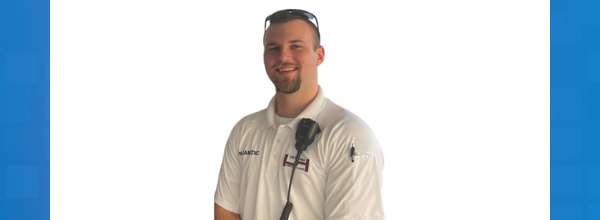Getting to know Supervisor James Fischer

November 7, 2022 | Category: News
Cetronia Ambulance Corps has four supervisors to lead two platoons. James Fischer is one of the newest to be promoted into an open position. James quickly learned that computer science was not his thing and fortunately landed on a career in EMS.
We did a little Q&A to find out more about James Fischer…
How long have you been working at Cetronia?
I have been an employee at Cetronia for two years.
Before Cetronia, where did you go to school, and what did you study?
After high school, I did one semester of computer science at a community college in NJ and disliked it so much that I sought to pursue a career in the opposite direction! Ultimately, I landed on EMS, and that is how I ended up going to the Pennsylvania College of Technology paramedic program. I loved having a hands-on education from day one.
When you were a kid, what did you want to be when you grew up?
As a kid, I thought becoming a pilot would be cool. In high school I started dual enrollment for computer science. Lots of my family members have a STEM background and I always thought I would follow that career path.
Can you walk me through your career path from entry level position to your current position?
With the educational pathway I took, my first job in EMS was a paid internship with an EMS agency local to Penn College, which was integrated within my final semester of the program. I was offered a full-time job with the same agency when I obtained my paramedic certification. I have a huge amount of respect for the EMTs who taught me how to function as a provider and I have never forgotten what it was like to be brand new and to need help to get through calls. After two years of working for that company, I wanted to move closer to my family in NJ. After looking into the companies in the area, I chose to apply to Cetronia. Since starting here, I spent one year working B platoon day shift in Whitehall, about six months on the Lehigh Valley Health Network Mobile Stroke Unit, and then moved to B platoon night shift.
What day-to-day responsibilities does your job entail?
As I transition into this new role, my responsibilities will change, but the goal is the same- to be ready for the next big thing as a team.
What project that you’ve worked on at Cetronia are you most proud of?
Over the summer I had the opportunity to help teach at our in-house EMT class. It was great to be able to share my experiences and explain the rationale behind the protocols.
What’s really fun about your job, and what’s really challenging?
I think we can all agree that the most fun part of EMS is found in the rare occasions when multiple units get down-time, and have the opportunity to spend that time together. Joking around with other crews and swapping stories about any recent atypical cases or comical events is a cornerstone of EMS.
How has your job here allowed you to grow personally and professionally?
I think working on an ambulance forces providers to come to terms with some hard truths. Some people aren’t always ready to receive help, but we still need to advocate for them. Some patients deserve better, but our best won’t always be enough. I think coming to terms with our role in the chain of care can be difficult, but it will mature anyone into a more accepting person.
What might surprise people about your job, or what’s one thing people don’t know about your position?
I am always explaining the paramedic scope of practice to people. Bystanders on calls sometimes think all we can do is transport a patient, but at other times have had bystanders expect an instant diagnosis. Explaining what the scope of treatments we are capable of is a constant part of the job.
What advice would you give to a young professional searching for a job like yours?
My advice for anyone interested in a career in EMS is that there are opportunities everywhere, if you can stay motivated. It is easy to burn out with what seems to be endless routine patients and constant over-time available. Pace yourself enough so that, when you come to work, you are able to provide the level of care you would want a family member to receive and leave the truck well stocked for the next crew. Ask questions. Get involved.
